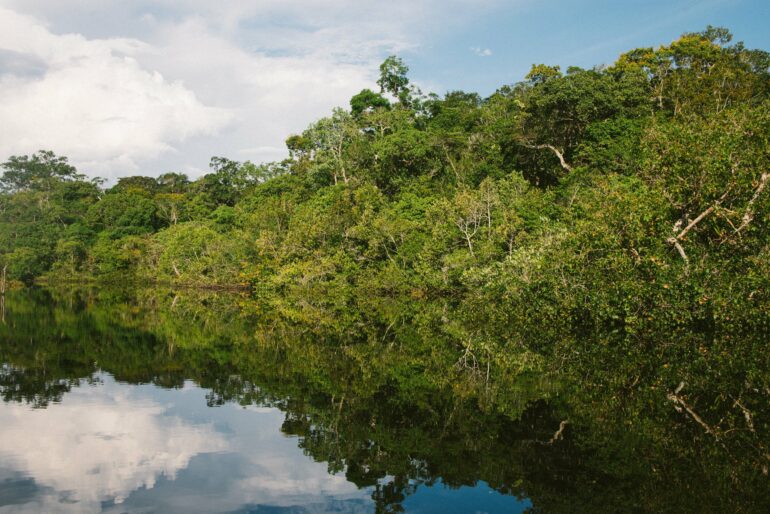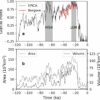Despite steps toward decreasing deforestation, uncontrolled wildfires are threatening environmental gains in Brazilian Amazonia, one of the world’s most critical carbon sinks and a region of high biological and cultural diversity.
An international team of scientists are raising the alarm in a letter published in Nature Ecology & Evolution. “Increasing wildfires threaten progress on halting deforestation in Brazilian Amazonia” is co-authored by researchers at the University of East Anglia (UEA) and the University of South Alabama, which led the study. Other contributors include Michigan State University, the National Institute for Space Research in Brazil and other institutions in North America, South America and Europe.
In June 2023, the number of active fires in the Amazon reached the highest peak since 2007. Total fire counts for the first half of 2023 were 10% higher than in 2022.
Dr. Matthew Jones, a Reseach Fellow in UEA’s School of Environmental Sciences and a co-author of the letter, said, “Climate change has led to a rise in drought and extreme heat, priming forests to burn more often.
“On top of this, deforestation and the expansion of agriculture have damaged the integrity of the region’s forests and weakened their resilience to drought.
“As a result, wildfires have become far more common than they would be in a normally functioning rainforest.”
Previous spikes in fire counts, including the record-breaking fires for a non-drought year in August and September 2022, were associated with widespread deforestation, a primary source of fire and a strong predictor of burned area.
Deforestation rates have been falling in 2023, with alerts 42% lower between January and July than in the same period of 2022. Environmental gains in the region also include the closure of major illegal mining operations that threaten the ecosystem and Indigenous communities, particularly in Yanomami territory.
Dr. Gabriel de Oliveira, an assistant professor at the University of South Alabama, is the lead author of the letter.
Dr. de Oliveira said, “This year’s high and climbing fire counts, in the context of reduced deforestation, highlight a decoupling of forest fires from deforestation. Indeed, only 19% of the fires were related to recent deforestation during January–June 2023, down from 39% in 2022.”
Hotter and drier climate conditions resulting from the 2023 El Niño are already impacting portions of the Amazon and may be increasing fires, consistent with prior El Niños, the researchers said.
Additional pressures may be affecting fire counts, including the lag effect of the deforestation boom associated with weakened enforcement of environmental laws under President Bolsonaro. Some areas of forest that were mechanically felled in recent years are only now becoming dry enough to burn.
Also, landholders may be burning pastures earlier in the dry season in anticipation of a fire moratorium later this year, expected under the return of stronger environmental governance of President Lula in the context of a strong El Niño linked drought.
Dr. Rachel Carmenta, a lecturer in climate change and international development at UEA and a co-author, said, “Effective and equitable fire governance is essential in order to avoid further marginalizing forest-dependent peoples who are both most heavily impacted when uncontrolled fires invade the forests upon which they depend, and most impacted by one-size-fits-all fire policy such as fire-bans.”
Indigenous groups have been using fire in their agriculture over millennia but have not experienced megafires like today. The current situation is driven by large-scale actors, climate change and forest fragmentation.
Dr. Carmenta said, “The role of distant consumers is huge. But the small traditional communities are often blamed, representing a double burden because they also suffer the most when invasive fires damage the forest, leaving it without the game, fruits, timber, medicines and resources they depend on.
“Identifying ways to manage these fires is essential in order to avoid further marginalizing forest-dependent peoples who are most heavily impacted when uncontrolled fires invade their territories, and most impacted by one-size-fits-all fire policy such as fire bans.”
Dr. Scott Stark, an assistant professor at Michigan State University, is a co-author of the letter. He said, “While research is needed to better understand the comparative contributions of these drivers, a clear expectation is that fire incidence will rise even higher with the anticipated drier conditions over coming months.”
Dr. de Oliveira said, “Nuanced science and management actions, including reforestation, forest management and agroforestry will be necessary to avert the risk of ‘runaway’ forest fire and degradation that is decoupled from deforestation.”
The authors are calling for strong, equitable and coordinated international efforts to tackle this growing threat.
In August, Brazil convened a summit of Amazon nations to address sustainable development and forest preservation in the region.
The summit’s resulting Belém Declaration established many important objectives, but it fell short of a strong commitment to achieving zero deforestation by 2030 or to substantially reducing forest fire frequency.
However, the declaration established an important alliance against deforestation, acknowledging fire as a point of concern, highlighting the needs of Indigenous Peoples and traditional local communities, and introducing a scientific body in the style of the Intergovernmental Panel on Climate Change (IPCC) aiming to produce evidence-based Amazon specific solutions.
“Brazil, other Amazon nations and the international community must cooperate and commit the support needed to rapidly advance research and governance for equitable fire-safe land management, while curbing forest loss and shifting from a commodity-based economic model to a sustainable bioeconomy that benefits all Amazonians and Amazon nations,” the authors said.
More information:
Gabriel de Oliveira et al., Increasing wildfires threaten progress on halting deforestation in Brazilian Amazonia, Nature Ecology & Evolution (2023).
Provided by
University of East Anglia
Citation:
Wildfires threaten environmental gains in climate-crucial Amazon (2023, October 16)



